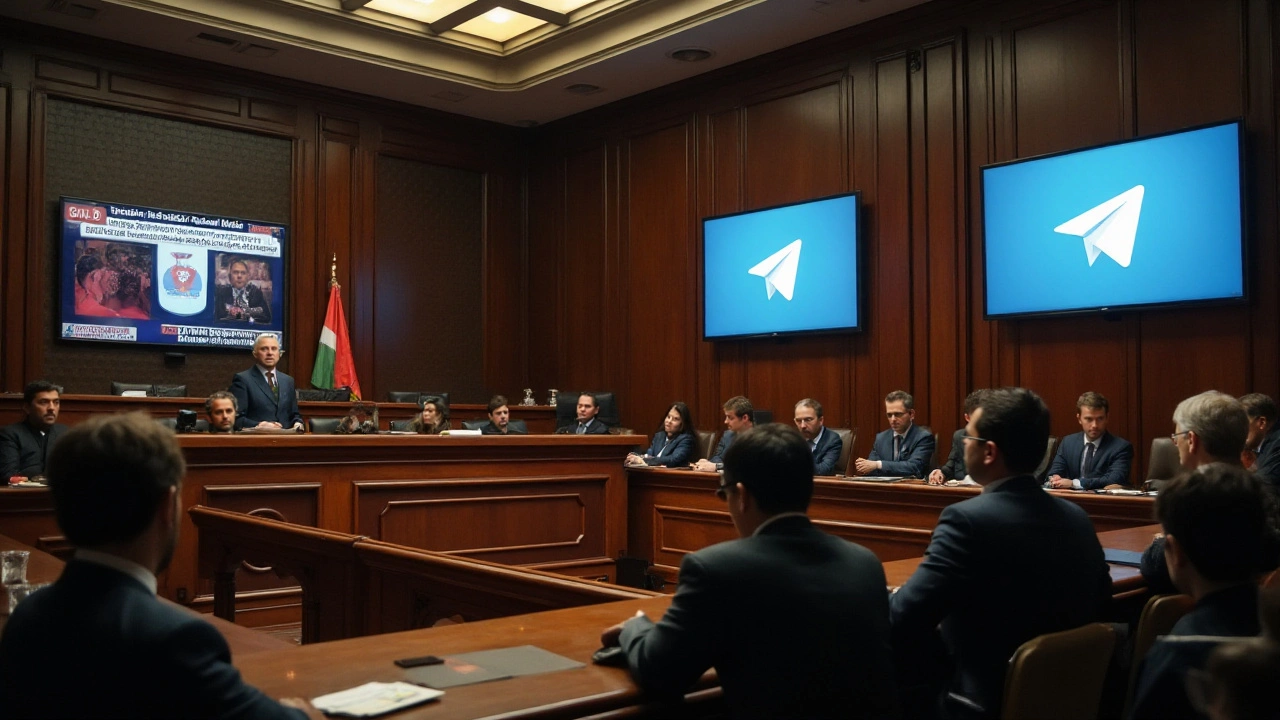Pavel Durov, the enigmatic founder of the popular messaging app Telegram, has found himself in hot water once again. On August 24, 2024, he was arrested in France, igniting a firestorm of controversy and debate around the world.
Durov has always been a staunch advocate for user privacy and freedom of expression. These principles have inevitably put him at odds with numerous governments, most notably Russia, where he first crossed the line in 2018 by refusing to provide access to user messages. Since then, Russia and other countries like Iran have moved to ban Telegram, yet users have found creative ways to bypass these restrictions.
This time, the arrest is linked to related content censorship concerns. But Durov's response has been singularly vocal, accusing global tech giants like Google and Apple of gatekeeping information on smartphones. His passionate arguments have only added fuel to the fire.
As we watch these events unfold, questions arise about the fair line between censorship and freedom of speech in our digital age. Durov’s case not only shines a spotlight on these issues but also reminds us of the ever-growing power and influence that tech companies wield over our daily communications.
In these complex times, it becomes vital for users to stay informed and understand the broader implications of these events, making it not just a fight for one man but perhaps a battle for digital freedom worldwide.
- Pavel Durov's Arrest
- History of Clashes with Governments
- Telegram’s Stance on Privacy
- Global Reactions to the Arrest
- The Future of Content Moderation
Pavel Durov's Arrest
On the morning of August 24, 2024, news broke that shook the tech world: Pavel Durov, the founder of Telegram, was arrested in France. The arrest came as a surprise to many, especially given Durov’s stance as a defender of user privacy and opponent of government censorship. His arrest is tied directly to content censorship issues, a subject that Durov has long been vocal about. He has criticized various governments for their attempts to pry into users' private messages and to control the flow of information.
Durov's arrest is rooted in ongoing tensions between Telegram and several governments over how content should be moderated on the platform. His refusal to comply with demands for access to user data has resulted in his app being banned or restricted in countries like Russia and Iran. The French authorities, however, have yet to make clear the exact reasons for his detainment, but rumors suggest it might involve an investigation into Telegram's content policies.
While being arrested is undoubtedly a severe turn of events, it is not the first time Durov has found himself at odds with a government’s agenda. Back in 2018, Russia's communications regulator, Roskomnadzor, tried to block Telegram after the app refused to cooperate with the authorities’ demands for user message data. This led to a massive wave of digital resistance as users in Russia found creative ways to circumvent the ban.
Certainly, Durov's arrest has sparked outrage among digital rights advocates and Telegram users alike. There have been calls for his immediate release, with many seeing this move as yet another attempt by authorities to stifle free speech and control online communication. Some have taken to social media to voice their frustration, pointing out that Durov’s arrest could potentially set a dangerous precedent for other tech entrepreneurs who champion privacy and freedom of expression.
Many speculate that this could be an orchestrated effort by multiple governments to crack down on Telegram’s unfaltering independence when it comes to user data and content moderation. Durov has always maintained that Telegram will not submit to pressure from any government, a stance that has won him both ardent supporters and fierce critics.
International reactions have been swift and varied. While some countries have expressed support for France's actions, others have condemned the arrest, viewing it as an overreach of governmental power. The tech community is watching closely, debating the implications of the arrest for the future of encrypted messaging platforms and the broader battle over content moderation and user privacy.
"This arrest could have a chilling effect on tech innovation and user privacy rights globally," said a spokesperson from the Electronic Frontier Foundation, a leading digital rights organization.
What happens next is still uncertain, but one thing is clear: Durov’s arrest has ignited a global conversation about the balance between government oversight and individual privacy. It's a conversation that is not only crucial for Telegram's future but for the future of digital communication as a whole.
History of Clashes with Governments
Pavel Durov's journey as a tech entrepreneur has been anything but smooth. The man behind Telegram has faced off with several governments, primarily due to his unwavering commitment to user privacy and freedom of expression. One of the earliest and most publicized confrontations occurred back in 2018 when Russia's communications regulator, Roskomnadzor, attempted to block Telegram. This incident sparked a digital rebellion among Telegram users in Russia. Many engaged in acts of digital resistance, employing VPNs and other tools to bypass the block. It became a cat-and-mouse game, with users continuously finding new ways to access the application despite the restrictions imposed by their government.
At the core of the conflict was Durov's refusal to hand over encryption keys that would have allowed the Russian government to access user messages. This stance on privacy wasn't just a business decision; it was a public declaration of his values. "Privacy is not for sale, and human rights should not be compromised out of fear or greed," Durov stated. His words resonated with many, turning him into a symbol of digital resistance.
The skirmish with Russia was only the beginning. Telegram faced bans and restrictions in several other countries, including Iran and China. In each case, the reason was the same: Telegram's resistance to government demands for access to user data. This made the platform a haven for those seeking communication free from government oversight. But it also made Durov a target. Governments, feeling threatened by the app's commitment to anonymity and privacy, took aggressive steps to curtail its influence.
Durov’s confrontations were often fueled by his proactive approach to Internet freedom. He has repeatedly criticized governments and tech giants alike for their roles in what he describes as the growing trend of online censorship. In a direct challenge to major tech companies, Durov accused both Google and Apple of paving paths for government censorship by controlling what apps could be accessed on their devices. This was not just a passing remark; it was a clear attack on the monopolistic control these companies have over the digital ecosystem.
In 2021, Durov went a step further, outlining how tech companies contribute to curbing internet freedom. He accused them of monopolizing the market and subtly pushing for content censorship through their app store policies. This stance led to another round of bans and restrictions in different countries, only serving to heighten his conflict with authorities. In a way, his mission has always been about creating a space where users can interact without fear, and governments see this as a direct threat to their control.
The numbers speak for themselves. According to a report, Telegram saw a 150 percent increase in its user base during the times it was facing bans. People rallied behind Durov’s cause, showing that the desire for private communication is a priority for many. His ongoing battles with different governments also opened up important conversations about the right to privacy in the age of digital communication.

Telegram’s Stance on Privacy
Pavel Durov, the brain behind Telegram, has always championed user privacy. His firm commitment to this cause stands out in an age where data is the new gold. From the very inception of Telegram, Durov made sure the app was built around the principle of safeguarding user information against prying eyes. This stance has not only set Telegram apart but also put it under immense pressure from governments and regulatory bodies worldwide.
One of the earliest and most notable confrontations happened in Russia in 2018. Russian authorities demanded access to Telegram users' messages. Durov's refusal to bow to these demands led to Roskomnadzor, Russia's telecommunications regulator, attempting to block the app throughout the country. While this move caused disruptions, it also sparked a wave of digital resistance. Users deployed VPNs and other circumvention tools, showcasing their solidarity with Telegram's mission. The ban was eventually lifted in 2020, serving as a testament to the power of collective digital activism.
Telegram's encrypted messaging system uses a protocol called MTProto. This ensures that the content of messages is only accessible to the sender and the recipient. This emphasis on end-to-end encryption means that not even Telegram can access the user data. Durov has often highlighted the importance of such features, especially in an age where breaches and misinformation are rampant. His dedication to privacy doesn't stop at encryption. Telegram introduces features such as self-destructing messages and secret chats, which add multiple layers of security, ensuring conversations remain just that - secret.
Durov once said, "Privacy is not for sale, and human rights should not be compromised out of fear or greed." This quote captures the essence of his belief system and forms the core around which Telegram operates.
This strong line on user privacy, however, hasn't come without its challenges. Several countries, including Iran, have enforced bans on Telegram, seeing it as a tool that fosters dissent and unregulated communication. Durov's approach has often been criticized as too rigid, given the complexities of national security concerns. Nonetheless, for millions of users worldwide, Telegram remains a sanctuary where their online communication is free from constant surveillance.
Statistics show that Telegram had over 500 million active users by 2022. This user base has grown as more individuals seek platforms that prioritize their privacy. The tension between ensuring user privacy and compliance with government regulations is a tightrope that Telegram continues to navigate. The debates surrounding this are more urgent than ever. As Durov's recent arrest in France indicates, the battle for digital freedom and privacy is far from over. Every move by Telegram sends ripples across the tech world, prompting discussions around the ethical responsibilities of tech companies in a digitally connected global community.
Global Reactions to the Arrest
The arrest of Pavel Durov has stirred reactions from all corners of the globe, shedding light on the deeper issues surrounding content censorship and user privacy. Many consider Durov a symbol of digital freedom, and his arrest has only magnified the battle between tech giants and governments. The tech community, activists, and general public alike have all chimed in with their views.
Major tech figures have voiced their opinions, emphasizing the need for protecting user privacy and condemning the arrest. Elon Musk tweeted, “Standing up for data privacy shouldn’t make you a criminal. What’s happening with Pavel Durov is a warning sign for all of us.” This sentiment was widely echoed, with the tweet gaining massive traction and support from netizens.
Privacy advocates and human rights organizations have also expressed their concerns. Amnesty International released a statement saying, “Arresting a tech entrepreneur for refusing to compromise on user data is a clear violation of digital rights. Governments should be protecting our freedoms, not curtailing them.” Many argue that this is not just about one individual but the broader implications it has on internet freedom and the digital landscape.
International governments have had mixed reactions. While some have remained silent, others have taken a firm stance. The U.S. State Department remarked, “We are closely monitoring the situation. User privacy and freedom of expression are cornerstones of democracy, and such actions raise significant concerns.” Conversely, more authoritative regimes have shown tacit support for the arrest, viewing it as a necessary measure to enforce national security.
The public opinion is heavily polarized. On one side, millions of users who depend on Telegram for secure communication see Durov’s actions as heroic and his arrest as unjust. A popular hashtag #FreeDurov trended on social media platforms, with people sharing stories of how Telegram has aided movements and protected their privacy in oppressive regimes.
On the other side, some argue that there must be a balance between user privacy and national security. French officials have reiterated their stance, stating, “While we understand the concerns over privacy, the unchecked nature of certain online platforms can pose severe threats to security and public order.”
This ongoing debate highlights the complex terrain tech companies navigate. Walking the tightrope between ensuring user privacy and complying with government regulations is becoming more daunting. It also raises significant questions about the power dynamics in the tech industry and the role of governments in regulating it.
Ultimately, Durov’s arrest serves as a pivotal moment in the digital age. Whether viewed as a champion of privacy or a controversial figure challenging governmental authority, his situation sets a critical precedent. As the world watches closely, the outcomes of these events could shape the future boundaries of digital freedom and governmental control in profound ways.

The Future of Content Moderation
The arrest of Pavel Durov has shone a harsh light on an issue that's been bubbling beneath the surface for years: the future of content moderation. As the founder of Telegram, Durov's arrest carries implications that extend far beyond his personal freedom, touching on how we, as a global society, manage online communications and the balance between freedom of expression and the need to curb harmful content.
One major aspect to consider is the continued evolution of artificial intelligence in policing content. More platforms are moving towards automated moderation systems to handle the sheer volume of user-generated content. This AI-driven approach can certainly help, but it also poses risks, such as false positives and the suppression of legitimate speech. The question becomes, how do we build systems that protect users without stifling their voice?
There's also an ongoing debate about the role of big tech companies in this landscape. Giants like Google and Apple have significant control over the apps that appear on their platforms, effectively giving them gatekeeper status. Pavel Durov himself has accused these companies of threatening censorship, a claim that warrants further scrutiny. Are these tech companies protecting users, or are they wielding too much power over the digital public square?
Government regulations are another pivotal factor. Nations around the world are grappling with how to legislate content moderation. Europe, with its stringent GDPR rules, is at the forefront of protecting user data but has also dabbled in legislation aimed at combating harmful content. However, this can be a tightrope walk, as overly restrictive laws might crush the very freedom they aim to protect. In the United States, Section 230 of the Communications Decency Act continues to be a hot-button issue, offering platforms a degree of immunity while also drawing criticism for allowing harmful content to proliferate.
An interesting development worth following is the rise of decentralized platforms like Mastodon and other blockchain-based solutions. These platforms promise a future where no single entity holds control over the conversations, theoretically offering a purer form of free speech. But they also face their own unique challenges—from governance issues to the potential for misuse by bad actors.
It's also crucial to think about the users themselves. The public's role in this content moderation conundrum shouldn't be underestimated. Educating users about digital literacy and the importance of responsible online behavior can go a long way. After all, platforms are only as good as the people who use them.
"Moderation is critical to the health of any online community, but it must be balanced carefully with the fundamental rights of free speech," said Tim Berners-Lee, inventor of the World Wide Web.
At the end of the day, the future of content moderation will likely be shaped by a combination of technology, regulation, and user behavior. With high-profile cases like Pavel Durov's, these conversations are pushed to the forefront, offering a rare opportunity for meaningful change. As global users, we all must stay informed and actively participate in these discussions to ensure that the future digital landscape is both safe and free.

Madhuri Singh
August 25, 2024 AT 10:49Lakshmi Narasimham
August 26, 2024 AT 02:37Amanda Dempsey
August 27, 2024 AT 22:55Ruth Ellis
August 28, 2024 AT 09:19Peter Novák
August 28, 2024 AT 11:32Siphosethu Phike Phike
August 29, 2024 AT 15:07Mitchell Ocran
August 31, 2024 AT 03:02Todd Gehrke
August 31, 2024 AT 06:07Allison Brinkley
August 31, 2024 AT 16:01Ghanshyam Kushwaha
September 1, 2024 AT 00:19eliana levi
September 2, 2024 AT 20:17Brittany Jones
September 4, 2024 AT 12:56SUBHANKAR DAS
September 5, 2024 AT 04:02Secret Lands Farm
September 5, 2024 AT 08:42Tamir Duberstein
September 5, 2024 AT 16:28John Bothman
September 7, 2024 AT 08:52Dinesh Gupta
September 8, 2024 AT 08:59Shalini Ambastha
September 8, 2024 AT 20:32